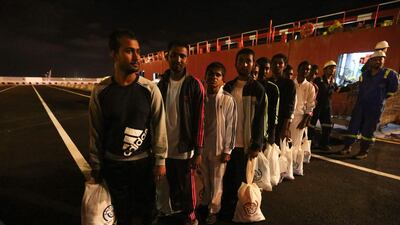Tunisia has allowed dozens of migrants, mostly from Bangladesh, to disembark after three weeks stranded in the Mediterranean, so that they can return to their home countries, the Red Crescent said on Wednesday.
An Egyptian boat rescued the migrants in Tunisian waters last month. But local authorities in the governorate of Medinine said its migrant centres were too overcrowded to let them ashore, leaving the vessel stranded 25 kilometres off the coastal city of Zarzis.
"After they were stranded for three weeks at sea in difficult conditions, Tunisia agreed to dock the ship, and migrants accepted to return to their countries in coming days," Red Crescent official Mongi Slim told Reuters.
Among the group who set off from Libya, 64 are from Bangladesh while nine are Egyptians, one is Moroccan and one Sudanese, the Red Crescent said.
All migrants will immediately be deported to their countries, except for the migrant from Sudan who has asked for asylum.
"We thank Tunisia's renewed commitment to life and dignity", said Lorena Lando, the head of the International Organisation for Migration in Tunisia.
She added that it is urgent to put in place a collaborative approach to helping migrants in the Mediterranean.
Neighbouring Libya's west coast is a frequent departure point for African migrants hoping to reach Europe by paying human traffickers. But their numbers have dropped after an Italian-led effort to disrupt smuggling networks and support the Libyan coastguard.
At least 65 migrants drowned last month when their boat capsized off Tunisia after setting out from Libya. On May 10, 16 migrants – most from Bangladesh – were saved by Tunisian fishermen. Two of those rescued decided to return home.
Last August, another commercial ship, the Sarost 5, was stranded for more than two weeks at sea with 40 migrants that it had rescued.
Worried about creating a precedent, Tunisian authorities said they accepted the migrants as an exception and for "humanitarian" reasons.
Fishermen from the North African country are spending more and more time pulling in stranded migrants after a sharp decline in humanitarian and European naval patrols along the stretch of water between war-wracked Libya and Italy.
Fishermen from Zarzis have saved the lives of hundreds of migrants in recent years, and as the number of boats leaving western Libya for Europe spikes with the return of calmer summer seas, they will probably have to save even more.
In the first four months of 2019, 164 people are known to have died on the route, a smaller number but a higher death rate than in previous years, with one dying for every three who reach European shores, the UN refugee agency UNHCR said.
Humanitarian boats and those of the European Union's "Operation Sophia" anti-piracy force had scooped up most stranded migrants in recent years.
But rescue operations dropped in 2019, due to a reduction in Sophia's operational zone and steps taken against rescue NGOs by European states seeking to limit migration.

